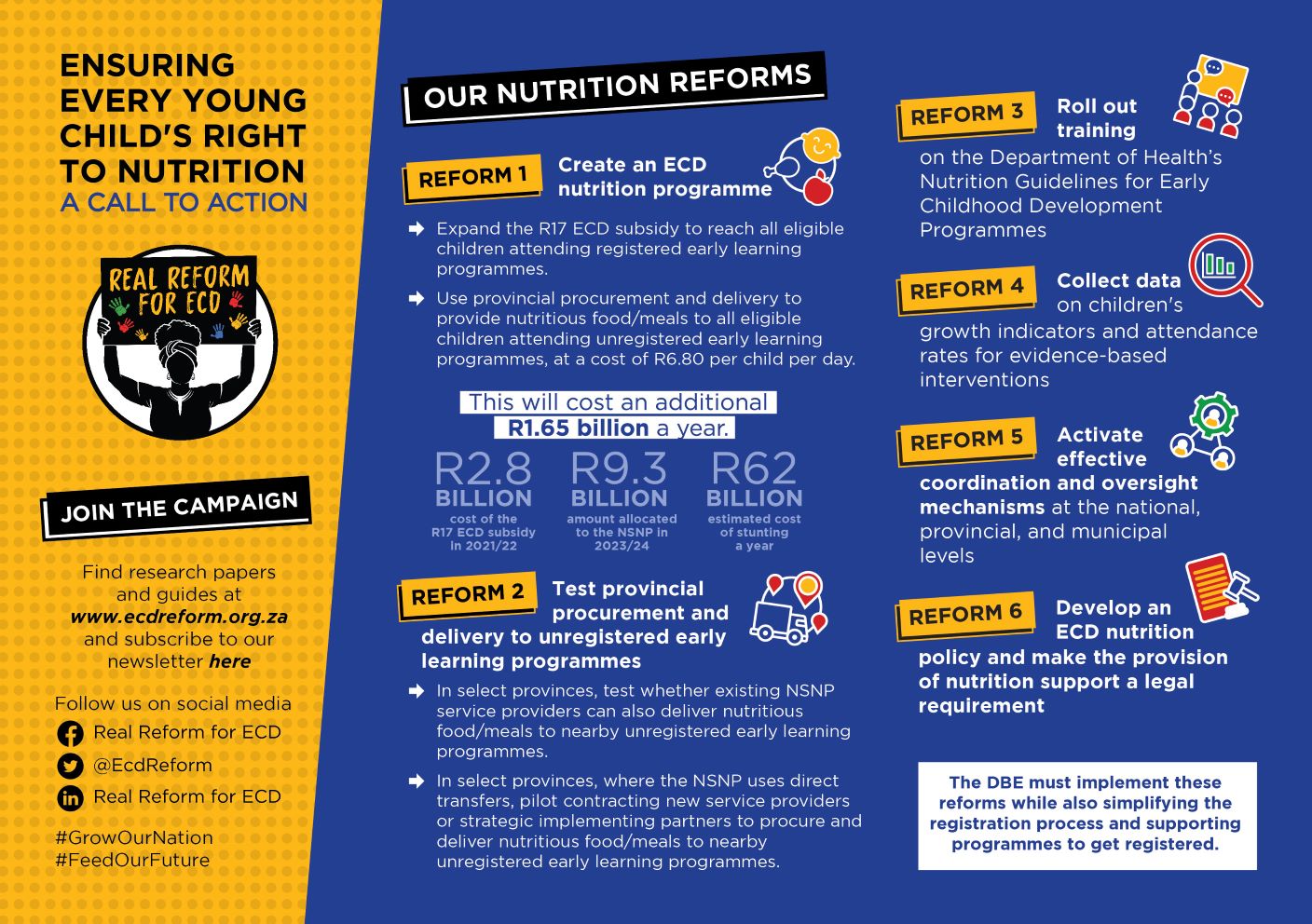
ECD REFORM OP-ED
Realising the critical right to early nutrition — SA’s youngest children must not be left behind

‘A more undignified scenario than starvation of a child is unimaginable. The morality of a society is gauged by how it treats its children. Interpreting the Bill of Rights promoting human dignity, equality and freedom can never allow for the hunger of a child.’ – Potterill ADJP, Equal Education v Minister of Basic Education
On 3 November, Real Reform for ECD launched its right-to-nutrition campaign with close to 200 early childhood development (ECD) practitioners in Finetown, Johannesburg. The campaign was more than a year in the making, bringing together lawyers, economists, nutritionists, practitioners, NGOs, and researchers, with one goal in mind: ensuring that all young children get the nutrition they need to learn and thrive.

Children from an Early Childhood Development (ECD) centre in Orange Farm reciting the preamble of the Constitution at the Right to Nutrition Campaign launch on 03 November. (Photo supplied: Government Communications and Information Systems Department (GCIS)).
The campaign’s six nutrition reforms are based on three research papers, which sought to answer some key questions:
- Do young children have the right to nutrition under the Constitution and what are the state’s duties in respect of this right?
- What constitutes adequate nutrition?
- What are the implementation models for getting nutritious food to eligible young children at early learning programmes, and what would it cost?
On the strength of these papers, we call for an ECD nutrition programme, similar to the National Schools Nutrition Programme (NSNP), to deliver nutritious meals to eligible young children at all early learning programmes.

Do young children have a right to nutrition?
Sections 28 and 29 of the South African Constitution provide a strong legal foundation for a young child’s right to nutrition.
Section 28(1)(c) clearly and explicitly gives every child the right to basic nutrition. Section 29(1)(a) gives everyone the right to basic education. Why is the right to basic education relevant?
The short answer is that if children are not eating properly, they cannot learn properly. This has been recognised by South Africa’s courts. Hence, we argue that section 29 must be interpreted to include a right to the nutrition required for early learning and development.
These rights are special, in that they are unqualified or ‘immediately realisable’ and the state must prioritise its resources accordingly. The special status of these rights is no accident. On the one hand, children are especially vulnerable; on the other hand, they are the future. It makes sense that their rights were given high priority in the Constitutional settlement.
And yet, for too many young children, the right to nutrition remains an on-paper promise and does not translate into their lived realities.
1 in 4 children in South Africa are stunted. Obesity is a growing problem. Almost half of young children suffer from hidden hunger and are deficient in important micronutrients. The lack of adequate nutrition impacts not only a child’s growth and development but also their ability to learn. The consequences are likely to be life-long.
Admittedly, parents are the primary duty-bearers when it comes to children’s rights. However, the courts have made clear that the state must take reasonable and effective steps to immediately realise a child’s right to basic nutrition where parents are unable to do so.
This duty is underscored by section 39(1) of the Constitution which requires that courts, when interpreting provisions in the Bill of Rights, should “promote the values that underlie an open and democratic society based on human dignity, equality and freedom”.
Accordingly, during the Covid-19 pandemic, the High Court held that the Department of Basic Education (DBE) must continue to provide meals under the NSNP to protect the human dignity of learners from poor families and ensure that they do not starve. The argument that hunger and starvation are an affront to human dignity, equality, and freedom is, at least, as strong in the case of young children in the early development phase.
That is why we are calling on the Department of Basic Education to provide nutrition support to all eligible children at registered and unregistered early learning programmes.
As a delivery point, early learning programmes make a lot of sense. Much like schools, early learning programmes are places where children routinely gather together — not just once a month, or once a fortnight, but almost every day. Moreover, by feeding children at early learning programmes, we can help to ensure that they’re able to engage with and benefit from the learning and development opportunities on offer, without being distracted by hunger.
It is vital that the state provides nutrition support to unregistered programmes.
Under the Children’s Act, early learning programmes are obliged to register with the government, but the reality is that most programmes are unable to meet the onerous registration requirements — especially those in rural and township areas. Just because a child attends an unregistered early learning programme, it does not mean that the state’s duty to that child falls away. In fact, the state may even have a heightened duty: it tends to be the unregistered programmes in rural and township areas — not the well-resourced suburban programmes — that serve the most vulnerable children. These are the children with some of the strongest claims to state support.
Currently, the main mechanism by which the DBE provides nutrition support to young children is the ECD subsidy. However, there are two main problems with the subsidy.
First, its value is too low, at R17 per eligible child per day, with just R6.80 allocated for nutrition. This is far below the food poverty line. Second, its reach is too limited. Most programmes don’t get the subsidy and, crucially, it is not available to unregistered programmes.
This coming financial year, the public sector is facing serious budget cuts. But the National Treasury has already allocated money for the DBE to run an ECD nutrition pilot. The DBE must seize this opportunity to realise the rights of all children to basic nutrition. It is a Constitutional imperative, and the cost of doing nothing for our youngest generation is far too high. DM
Tatiana Kazim is from the Equal Education Law Centre. This Op-Ed is the first in a three-part series written by researchers who worked on three papers that informed Real Reform for ECD’s Right to Nutrition campaign. The second will look at what constitutes adequate nutrition and the third looks at various implementation models and their cost.





















 Become an Insider
Become an Insider
The National School Nutrition Programme Conditional Grant(NSNP) is supposed to fund the feeding of children every school day. I cannot understand why the existing feeding stations – the schools – cannot be used to provide for 2-5 year old children. There is no need to send funds to ECD centres, registered or not. If a hungry stomach is present, it can be fed at schools where both preparation facilities and food are already in place, The funding of the NSNP CG can be augmented appropriately to cover the additional costs of foodstuffs and the increase, albeit minimal, in preparation costs. Sending money to ‘ECD centres’, particularly as is likely, the many that are unregistered and impossible to monitor, will not ensure that these very young children are fed. The numbers of ECD-age children need merely be collated at each school so that the appropriate additional funding can be provided. Assuming monitoring is effective, such that misapplication, misappropriation and theft of funds is minimised, this should provide for these children’s needs. All primary schools are located near the communities they serve. There can be few ECD centres that are so far away from a primary school as to render this proposal unworkable. Access to these feeding stations by these children or adult carers who collect appropriate amounts of food needed by their wards should not mitigate against this approach to the extension to ECD-age children, of the existing School Nutrition Programme.
There is a whole more to getting the nutrition programme going. We need to know what food they will be getting as pap alone wont do it – we don’t want to go back to the days of Kwashiokor! They need fruit and veg and school veggi gardens should be part of the programme. Delivery to the kids must be ensured since often adults responsible for giving out the food look out for themselves before feeding needy kids.